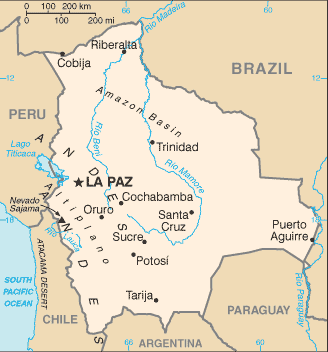 Coca-growers in Bolivia's lowland jungle town of Yapacaní on March 27 clashed with police in a protest against the construction of a new base of the Mobile Rural Patrol Unit (UMOPAR), the hated coca-eradication force. Protesters set up roadblocks in an effort to prevent construction crews from breaking ground on the new base. When National Police troops used tear-gas to break up the blockades, protesters replied by hurling rocks. Regional police commander Johnny Requena blamed drug gangs for the opposition to the base, which is being financed by the European Union to the tune of $1.3 million.
Coca-growers in Bolivia's lowland jungle town of Yapacaní on March 27 clashed with police in a protest against the construction of a new base of the Mobile Rural Patrol Unit (UMOPAR), the hated coca-eradication force. Protesters set up roadblocks in an effort to prevent construction crews from breaking ground on the new base. When National Police troops used tear-gas to break up the blockades, protesters replied by hurling rocks. Regional police commander Johnny Requena blamed drug gangs for the opposition to the base, which is being financed by the European Union to the tune of $1.3 million.
But Yapacaní municipal councillor Max Barrientos told reporters that the UMOPAR troops are abusive and rough up cocaleros. Yapacaní, in Santa Cruz department, borders the Chapare coca-producing region where Bolivia's President Evo Morales rose to prominence as a leader of the cocalero protest movement against UMOPAR's operations 20 years ago. As president, Morales has led an international campaign to decriminalise the ancient Andean tradition of chewing coca leaves. But his government still sends UMOPAR to wipe out crops deemed "illegal" in the Chapare.
After the riot, the government's Vice-Ministry for Social Defense and Controlled Substances pledged to establish a dialogue with local residents in Yapacaní and seek their consensus for construction of the new base. But the conitnued eradication program poses a long-term dilemma for the populist Morales, who seems to be undermining his own political support base among the cocaleros. (Los Tiempos de Cochabamba, March 31; Erbol, March 28; BBC News, March 27)
Cross-post to High Times
Graphic: Perry-Castañeda Library Map Collection







Recent comments
4 weeks 2 days ago
4 weeks 3 days ago
7 weeks 3 days ago
8 weeks 3 days ago
12 weeks 3 days ago
16 weeks 1 day ago
20 weeks 1 day ago
21 weeks 7 hours ago
31 weeks 6 hours ago
35 weeks 17 hours ago